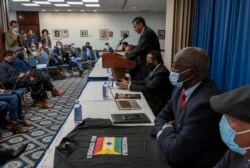The U.N. Security Council has called for an end to escalating fighting in Ethiopia’s northern Tigray region as rebel Tigrayan forces announce the formation of an alliance to end the government of Prime Minister Abiy Ahmed.
In only the second statement on Ethiopia since the fighting began a year ago, the 15-member council Friday urged all parties in Ethiopia “to put an end to hostilities and to negotiate a lasting cease-fire.”
The council also "called for refraining from inflammatory hate speech and incitement to violence and divisiveness."
"Today the Security Council breaks six months of silence and speaks again with one united voice on the deeply concerning situation in Ethiopia," Ireland's U.N. Ambassador Geraldine Byrne Nason said in a statement. She said it was the first time that the council called for an end to hostilities in Ethiopia.
Council members said the language in the statement was amended to remove a call for an “immediate” end to hostilities “without preconditions” because of objections from Russia, according to The Associated Press.
The U.N. call comes as Tigray forces announced Friday that they have formed an alliance with other armed and opposition groups around the country, including forces in the Oromo region, to end the government of Prime Minister Abiy. The Tigrayan forces said they were willing to bring down the prime minister through negotiation or force.
Ethiopia's government called the creation of an alliance “a publicity stunt.”
Also on Friday, all Americans were urged to leave Ethiopia “as soon as possible,” according to a security alert posted on the website of the U.S. Embassy in Addis Ababa, which called the security situation in the country “very fluid.”
In a warning on its travel advisory website, the State Department warned Americans Friday “not travel to Ethiopia due to armed conflict, civil unrest, communications disruptions, crime, and the potential for terrorism and kidnapping in border areas.”
On Saturday, the State Department said it ordered “non-emergency U.S. government employees and their family members” to leave the country on November 5.
The Ethiopian government declared a six-month state of emergency Wednesday and called on residents to defend their neighborhoods if rebels arrive in the capital.
Tigrayan forces said earlier this week they were advancing on the capital of Addis Ababa and that it could fall within months or even weeks.
Threats of physical harm on Twitter prompted the social company to temporarily deactivate its Trends section Friday in Ethiopia.
“Given the imminent threat of physical harm, we’ve … temporarily disabled Trends in Ethiopia. Alongside continued efforts to disrupt platform manipulation, we hope this measure will reduce the risks of coordination that could incite violence or cause harm,” Twitter said.
Thursday marked the first anniversary of Prime Minister Abiy’s deployment of troops to Tigray in response to the Tigray People’s Liberation Front’s seizure of military bases. The ensuing conflict has killed thousands of people, displaced several million from their homes and left 400,000 residents of Tigray facing famine, according to a July estimate by the United Nations.
The escalating violence in Ethiopia could trigger a humanitarian crisis that could spread to neighboring countries and even Europe, according to Hassan Khannenje, director of the HORN International Institute for Strategic Studies in Nairobi, Kenya.
According to Reuters, Khannenje said in an interview with China Global Television Network that Ethiopia’s uncertain status as an anchor state in Africa threatens to cause “a potential humanitarian catastrophe that may affect not just countries neighboring Ethiopia but countries in much of the continent, pushing refugees probably all the way to Europe and elsewhere."
A joint investigation by the U.N. and the government-created Ethiopian Human Rights Commission published a report Wednesday concluding that all sides in the conflict have committed human rights violations, including torturing civilians, gang rapes and arresting people based on ethnicity.
U.N. High Commissioner for Human Rights Michelle Bachelet said some of those abuses may amount to war crimes and crimes against humanity.
Margaret Besheer contributed to this report. Some information came from Reuters and the Associated Press.






